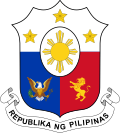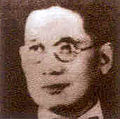| Tanggapan ng Taga-usig Panlahat | |
 | |
| Department overview | |
|---|---|
| Formed | June 6, 1901 |
| Jurisdiction | Government of the Philippines |
| Headquarters | OSG Building, 134 Amorsolo St., Legaspi Village, Makati, Philippines |
| Motto | Integrity in Advocacy. Social Justice through Advocacy. |
| Employees | 824 (2024) [1] |
| Annual budget | ₱1.37 billion (2023) [2] |
| Department executive |
|
| Parent Department | Department of Justice |
| Website | www.osg.gov.ph |
The Office of the Solicitor General of the Philippines (Filipino : Tanggapan ng Taga-usig Panlahat), formerly known as the Bureau of Justice, is an independent and autonomous office attached to the Department of Justice. The OSG is headed by Darlene Berberabe.
Contents
- History
- Attorney General and Solicitor General
- Secretary of Justice
- Solicitor General
- Powers and functions
- Organizational structure
- List of attorneys general
- List of solicitors general
- References
- External links
The Office of the Solicitor General is the "law firm" of the Republic of the Philippines. The Solicitor General is the principal law officer and legal defender of the Republic of the Philippines. The Solicitor General shall have the authority and responsibility for the exercise of the Office's mandate and for the discharge of its duties and functions, and shall have supervision and control over the Office and its constituent units. [3] The Office of the Solicitor General also determines the legal position that the government will take in the courts and argues in virtually every case in which the government is a party. The OSG is tasked to represent the people of the Philippines, the Philippine government, its agencies, instrumentalities, officials, and agents in any litigation, proceeding, or investigation before the Supreme Court and the Court of Appeals. [4] When authorized by the President, the Solicitor General shall also represent government owned or controlled corporations.








































